62 news posts

Featured news
25 Nov 2024
Viking colonizers of Iceland and nearby Faroe Islands had very different origins, study finds
Geneticists have studied the distribution of Y-chromosome haplogroups on the Faroe Islands, known to have been colonized by Vikings around the year 900 CE, and compared these to distributions of haplogroups in today’s Scandinavia. They showed with novel analysis methods that the haplotype distribution in the Faroe Islands most closely resembled that in Norway and Denmark, and to a lesser extent that in Sweden, but differed from that in Iceland. They concluded that a band of Viking men from all over Scandinavia colonized the Faroe Islands, which differed in their geographical origin and genetic make-up from those who settled Iceland.

Featured news
15 Nov 2024
Students who use dating apps take more risks with their sexual health
Researchers from the US looked for associations between the use of dating apps, sexual behavior, and a history of HIV/STIs among college students in North Texas. They showed that there was an association between risky sexual behavior and the use of dating apps. They propose that the two may be mutually reinforcing.

Life sciences
18 Oct 2024
Scientists create new overwintering sites for monarch butterflies on a warming planet
Migrating monarch butterflies depend on mountain forests of sacred firs in Mexico as overwintering sites. These forests are under threat from global warming. But researchers from Mexico have now shown that seedlings derived from their original range can be transplanted successfully to a new site further east, on the higher and colder volcano Nevado de Toluca. The resulting new stand of sacred firs could ultimately serve as the overwintering sites of the future.
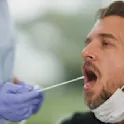
Featured news
01 Oct 2024
‘Cheeky’ discovery allows scientists to estimate your risk of dying using cells found in the mouth
Over the past decade, several epigenetic clocks have been developed to track physiological aging. Until recently, all had been based on the DNA methylome of blood cells – onerous and stressful to collect. But now, scientists from the US have shown for the first time that their new epigenetic clock CheekAge, which uses easy-to-collect cheek cells, can accurately predict mortality. This suggests that cheek swabs could be an improved way to measure and predict healthy vs unhealthy aging and mortality in humans.

Featured news
20 Sep 2024
Oceanic life found to be thriving thanks to Saharan dust blown from thousands of kilometers away
Scientists from the US measured the relative amounts of ‘bioreactive’ iron in four sediment cores from the bottom of the Atlantic. They showed for the first time that the further dust is blown from the Sahara, the more iron in it becomes bioreactive through chemical processes in the atmosphere. These results have important implications for our understanding of the growth-promoting effect of iron on oceanic phytoplankton, terrestrial ecosystems, and carbon cycling, including under global change.
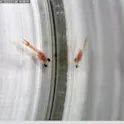
Featured news
17 Sep 2024
How does a tiny shrimp find its way home in a vast ocean? Study finds it’s down to their cave’s special smell
Researchers from France have shown for the first time that mysid shrimp can distinguish between seawater from their cave of origin and that from nearby caves. This recognition behavior, based on local differences in water-borne odor mixes or ‘chemical seascapes’, is likely what enables the shrimp’s homing behavior when they return each dawn from their foraging trips in open water.
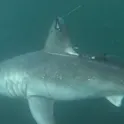
Featured news
03 Sep 2024
Large sharks may be hunting each other – and scientists know because of a swallowed tracking tag
A surprise killing of a pregnant porbeagle shark being tracked near Bermuda left researchers trying to solve an oceanic mystery. From the transmitted data, they were shocked to discover that it was likely eaten by an even larger shark, in what is the first recorded case of its kind

Health
30 Aug 2024
Promising antibiotic candidates discovered in microbes deep in the Arctic Sea
Researchers from Finland and Norway developed a new suite of methods for the screening of antivirulence activity of unknown compounds of bacterial origin. The compounds tested had been derived from actinobacteria living inside invertebrates in the Arctic Sea. They found two interesting compounds with strong antivirulence or antibacterial effects against enteropathogenic E. coli. These results demonstrate the potential of prospecting novel habitats for promising new antibacterial drugs, to solve the current global antibiotics crisis.
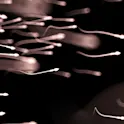
Featured news
23 Aug 2024
Men infected with high-risk types of HPV could struggle with fertility
Researchers from Argentina compared semen quality between men infected with high-risk (HR-HPV) and low-risk (LR-HPV) genotypes of human papillomavirus and HPV negative men. They showed that HR-HPV positive men had higher percentages of dead sperm, a higher level of reactive oxygen species, and a lower count of white blood cells in their semen. These results suggest that HR-HPV positive men, but not LR-HPV positive men, may have lower fertility due to oxidative damage to sperm.

Featured news
08 Aug 2024
Microbes conquer the next extreme environment: your microwave
Researchers have measured the diversity of microbes inside microwaves for the first time. They showed that microwaves harbor a specialized community of locally adapted microbial genera, which resembles that reported on kitchen surfaces and in another extreme, highly irradiated habitat: on solar panels. This finding has potential biotechnological applications, in processes that require microbes resistant to thermal shock, radiation, and desiccation.
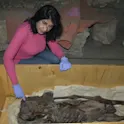
Featured news
02 Aug 2024
'Screaming Woman' mummy may have died in agony 3,500 years ago
Researchers from Egypt used state-of-the-art techniques to ‘virtually dissect’ a female mummy from the New Kingdom, named the ‘Screaming Woman’ for her remarkable expression. They showed that she had been embalmed with costly imported frankincense and juniper. There was no obvious cause of death, but the mummy’s wide open mouth may be due to cadaveric spasm, which is typically associated with dying in considerable pain and under strong emotions.

Health
26 Jul 2024
Conflicting health advice from agencies drives confusion, study finds, but doctors remain most trusted
Researchers from the US analyzed replies to the Health Information National Trends Survey and found that doctors are more trusted than scientists and especially government health agencies. The results revealed that perceived uncertainty in health recommendations, inherent in the scientific process, tends to confuse the public and undermine its trust in experts apart from doctors. This implies that doctors are best placed to communicate changes in recommendations, to ensure better health and restore trust in agencies.

Space sciences and astronomy
12 Jul 2024
Real-life ‘stillsuit’: Dune-inspired upgrade for spacesuits allow astronauts to recycle urine into water
Existing waste management systems for spacesuits are uncomfortable, unhygienic, and don’t recycle valuable water in urine. Now, researchers from Cornell University have designed a prototype for an integrated urine collection and recycling system, which can be carried on the back of next-generation spacesuits. The system is now ready for testing.

Featured news
05 Jul 2024
Desert-loving fungi and lichens pose deadly threat to 5,000-year-old rock art
Researchers sampled microflora from the rocks bearing unique, millennia-old petroglyphs in the Negev desert. The diversity and abundance of species found on these rocks was low, suggesting that few can survive the harsh conditions. Most identified species from the petroglyphs were specialized microcolonial fungi and lichens, known to damage rock art through mechanical and chemical means. The authors cautioned that these natural deterioration processes can’t be stopped, making it necessary to monitor and document this important cultural heritage.

Featured news
02 Jul 2024
Study shows hairy skin does not become less sensitive with age
Our sense of touch is generally thought to decline with age, just like the other senses. However, a study has now shown for the first time that age-related decline in sensitivity only happens in hairless skin like the tip of the index finger, but not in the hairy cheeks and forearms. The authors speculate that the exceptional sensitivity of the cheeks throughout life is due to our evolutionary history as social primates, for whom touch is an important method of communication.